Academicos
Guillermo Blanc - Profesor Adjunto
|
Ph.D. en Astronomía, 2011, U. de Texas, EE.UU. Línea de Investigación: Formación de Galaxias, Estructura del Universo, formacion de Estrellas. Teléfono: 56 (2) 2 977 1132 E-mail: gblancm[at]das.uchile.cl |
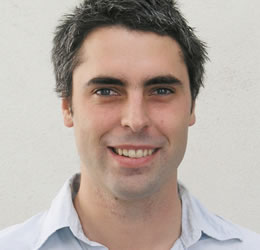 |
Áreas de Interes My research is focused on trying to understand the processes by which galaxies form and evolve throughout the history of the Universe. I do this by studying both galaxies in the local “present day” universe as well as at high redshift, where we can observe the early epochs of galaxy evolution. I'm involved in a series of research projects on the properties of young galaxies at high redshift, the large scale structure of the Universe, the nature of Dark Energy, the process of star formation on galactic scales, and the measurement of chemical abundances in galaxies. |
|
Leonardo Bronfman - Profesor Titular
|
Ph.D. en Astrofísica, 1986, U. de Columbia,EEUU. Línea de Investigación: Nubes Moleculares, Formación Estelar, Estructura Galáctica. Teléfono: 56 (2) 2 977 1113 E-mail: leo[at]das.uchile.cl |
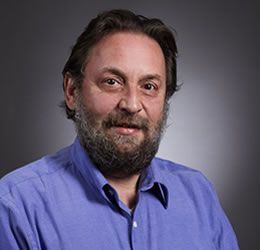 |
Áreas de Interes My main line of research is the large scale distribution and the physical properties of molecular clouds and regions of massive star formation in the Milky Way. I carry on large scale surveys of the millimeter and sub millimeter line and continuum emission to determine statistically the physical properties of the gas and dust involved in the formation of massive stars. The most interesting regions from these large data bases are selected for individual studies, at the highest resolution and sensitivity available, to unveil the fairly unknown earliest phases of massive star formation. |
|
Luis Campusano - Profesor Titular
|
Ph.D. en Astrofísica, 1992, U. de Toulousse, Francia. Línea de Investigación: Cuasares, Cosmología. Teléfono: 56 (2) 2 977 1100 E-mail: luis[at]das.uchile.cl |
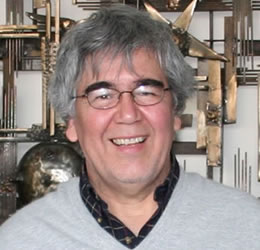 |
Áreas de Interes Astrónomo Visitante de los observatorios: Interamericano de Cerro Tololo (Chile), Las Campanas (Carnegie Institution of Washington, Chile), La Silla (ESO, Chile) y Paranal (ESO, Chile). Ha pertenecido a diversos directorios: del Observatorio Astronómico Gemini (2002-2007), de la Sociedad Chilena de Astronomía (2008, y de 2010 a la fecha). Y Director de la Oficina Conicyt para Proyecto Astronómico Gemini, Conicyt (2000-2006) y el Primer Director del Programa de Astronomía de Conicyt (2006 - 2007). En 2010 se desempeña como Profesor Visitante de la Yale University, New Haven. |
|
Simón Casassus - Profesor Titular
|
Ph.D. en Astrofísica, 1999, U. de Oxford, Reino Unido. Línea de Investigación: Protoplanetary Disks, Planet Formation, Circumstellar and Interstellar Media. Teléfono: 56 (2) 2 977 1137 E-mail: scasassus[at]u.uchile.cl Webpage: http://madnucleus.com |
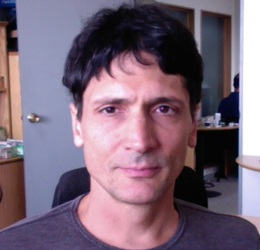 |
Áreas de Interes My research currently focusses on the astrophysics of protoplanetary disks, and targets the observation of on-going planet formation. I combine radio/IR expertise in observations of circumstellar dust and gas, whose interpretation is informed by radiative transfer and hydrodynamics. The challenge of understanding planet formation requires the concerted efforts of a team of researchers. I am the principal investigator for the MAD Nucleus, which studies the early evolution of planetary systems from a comprehensive approach, both observational and theoretical (http://madnucleus.com). |
|
Edgardo Costa - Profesor Titular
|
Lic. en Astronomía, 1978, U. de Chile. Línea de Investigación: Astrometría: Paralajes - Movimientos Propios - Cinemática del Grupo Local, Cúmulos Abiertos - Estructura Espiral. Teléfono: 56 (2) 2 977 1116 E-mail: costa[at]das.uchile.cl |
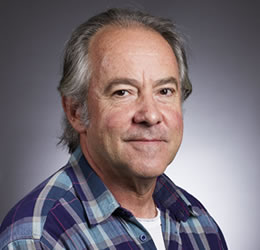 |
Áreas de Interes El profesor Costa ha dictado un importante número de materias en la Universidad de Chile, dentro de los que se encuentran (en pre y postgrado): Astronomía General, Astronomía Experimental, Laboratorio de Astronomía, en otros. |
|
Andrés Escala - Profesor Asociado
|
Ph.D., 2004, Yale University, EEUU. Doctor en Ciencias, 2004, Universidad de Chile. Línea de Investigación: Theoretical Astrophysics/Numerical Simulations, Massive Black Hole Mergers and Growth, Star and Galaxy Formation. Teléfono: 56 (2) 2 977 1134 E-mail: aescala[at]das.uchile.cl |
 |
Áreas de Interes My research interests spans in a broad range of topics in theoretical astrophysics, using both analytical and numerical (SPH and AMR techniques) approaches. My current interests are: BH Mergers, BH Growth and Star/Galaxy Formation. |
|
Ricardo Finger - Profesor Asociado
|
Ph.D. en Ingenieria Eléctrica, 2013, U. de Chile, CHILE. Licenciado en Física, 2004, U. de Chile, Chile Línea de Investigación: Instrumentación Astronómica, Receptores Heterodinos, Procesamiento digital de señales, materiales. Teléfono: 56 (2) 2 977 1150 E-mail: rfinger[at]das.uchile.cl |
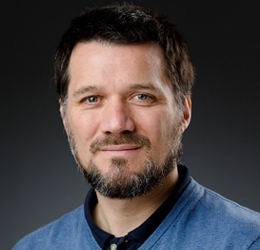 |
Áreas de Interes I enjoy doing engineering and science. I have worked in telecommunications, technology integration, scientific research and scientific-technological projects. My expertise is mostly in laboratory work doing physics and astronomical instrumentation, as well as on-field commissioning of astronomical instruments. I am now mostly involved in instrumentation project engineering and management, as well as doing research on millimeter/sub-millimeter receivers, high speed radio-astronomy digital signal processing and getting into galactic astronomy. |
|
Cesar Fuentes - Profesor Asistente
|
Ph.D. en Astronomía, 2010, U. de Harvard, EEUU. Línea de Investigación: Formación Estelar, Medio Interestelar. Teléfono: 56 (2) 2 977 1131 E-mail: cfuentes[at]das.uchile.cl Webpage: http://www.das.uchile.cl/~cfuentes/ |
 |
Áreas de Interes The main question that drives my research is how easy it is to form life in the Universe. My approach to this problem has been the study the history of planet formation in our own Solar System, and placing it in comparison with extrasolar planets and systems. I do this by measuring the statistical distribution and properties of small objects in the Solar System (comparing it with different models for the formation of and evolution of the System), studying exoplanets that transit their host stars, and the dynamical evolution and stability of planetary systems throughout their formation history. The areas I work on are: time domain astronomy, moving object detection, dynamics, precision photometry, all in the context of the emergence of BigData and new astronomical observatories like LSST. |
|
Guido Garay - Profesor Titular
|
Ph.D. en Astronomía, 1983, U. de Harvard, EEUU. Línea de Investigación: Medio Interestelar, Formación Estelar. Teléfono: 56 (2) 2 977 1141 E-mail: guido[at]das.uchile.cl |
 |
Áreas de Interes My research focus primarely on the study of a range of phenomena that are associated with the early stages of massive star formation: compact regions of ionized gas, massive and dense molecular cores, ionized jets, bipolar molecular outflows, and accretion disks. The goal is to determine the physical characteristics and dynamics of these objects in order to get a deeper understanding of how massive stars are formed and evolve. To accomplish this, I carry out single dish and interferometric observations at millimeter and centimeter wavelengths. |
|
Valentino González - Profesor Asistente
|
Ph.D. en Astronomía and Astrofísica, 2012, U. of California Santa Cruz, EEUU. Línea de Investigación: Formación y evolución de Galaxias lejanas. Teléfono: 56 (2) 2 977 1124 E-mail: valentino[at]das.uchile.cl Webpage: http://valentinoetal.wordpress.com |
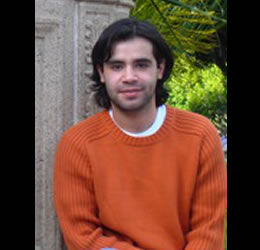 |
Áreas de Interes El objetivo de mi investigación es comprender cómo se formaron las primeras galaxias y cómo evolucionaron hasta llegar a tener las propiedades que hoy les conocemos. Para ello estudio las propiedades observables de las galaxias más distantes que es posible detectar con la tecnología actual, enfocándome en los primeros 2 mil millones de años de la historia del Universo. Para observar galaxias tan distantes utilizo las imágenes más profundas del cielo obtenidas con los telescopios espaciales Hubble y Spitzer en campos como el Ultra-deep field (UDF). Mi investigación involucra modelar las poblaciones estelares de estas galaxias distantes para estimar propiedades de ellas como su masa estelar, tasa de formación estelar, edad, contenido en polvo, etc. |
|
Mario Hamuy - Profesor Titular
|
Ph.D. en Astronomía, 2001, U. de Arizona, EEUU. Línea de Investigación: Supernovas, Cosmología. Teléfono: 56 (2) 2 977 1101 E-mail: mhamuy[at]das.uchile.cl Webpage: http://www.das.uchile.cl/~mhamuy/ |
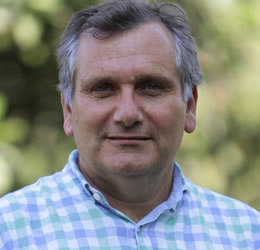 |
Áreas de Interes I am interested in the study of supernovae. I am the principal investigator of the Millennium Center for Supernova Studies (MCSS), which includes 5 professors, 4 postdocs, 4 PhD students and more than 10 undergraduates. Our activities involve a nearby supernova search program (CHASE) using the PROMPT robotic telescopes located at Cerro Tololo, the development of our own 50 cm robotic telescope, and photometric and spectroscopic followup of selected supernovae. The main goal of the MCSS is the study of the physics of supernovae and their use as distance indicators. |
|
Eduardo Hardy - Profesor Adjunto
|
Ph.D. en Astronomía, 1976, U. of Indiana, EEUU. Línea de Investigación: Galaxias, Poblaciones Estelares, Cosmología. E-mail: ehardy[at]das.uchile.cl |
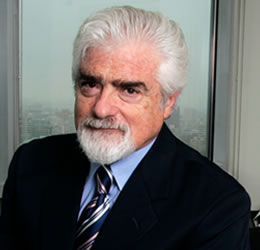 |
Áreas de Interes Galaxies, Stellar Populations, Cosmology. Representante en Chile, Associated Universities Inc., National Radio. |
|
James Jenkins - Profesor Asociado
|
Ph.D., en Astronomía, 2007., U. de Hertfordshire, Reino Unido. Línea de Investigación: Enanas café, Sistemas planetarios, Astrofísica Estelar, Planetas Extrasolares. Teléfono: 56 (2) 2 977 1125 E-mail: jjenkins[at]das.uchile.cl Webpage: http://www.das.uchile.cl/~jjenkins/ |
 |
Áreas de Interes I am PI of a long term effort to discover and characterise benchmark extrasolar planets (aka. exoplanets) in the southern hemisphere. The main goal is to detect short period transiting planets around bright stars where follow-up ground and space-based analysis can lead to further breakthroughs into the physics of exoplanetary atmospheres. In addition, we also aim to study and detect the lowest mass planets, down into the Earth-mass regime. We employ the radial-velocity technique to detect such systems, utilising instruments such as the HARPS spectrograph. HARPS is shown to be stable down to around 80cm/s in the long term on real stars and we aim to make use of such precision to detect planets down into the low mass rocky regime. |
|
Paulina Lira - Profesora Asociado
|
Ph.D., en Astronomía, 1999., U. de Edimburgo, Reino Unido. Línea de Investigación: Galaxias Activas, Galaxias. Teléfono: 56 (2) 2 977 1138 E-mail: plira[at]das.uchile.cl |
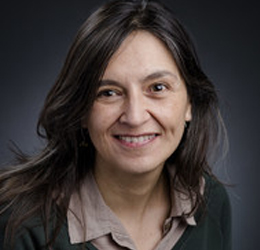 |
Áreas de Interes I am mostly interested in AGN, at low and high redshift. We are trying to understand the variability properties of a large sample of AGN using the QUEST optical camera and NIR data from the UltraVista and VIDEO surveys. Also, we are following a small sample of local well known Seyferts using the SMARTS telecopes to determine their optical and NIR light curves. I'm also interested in the obscuration properties of AGN and we are studying the dusty torus for a well defined sample of nearby Seyferts using IR imaging in the 1-10 um range and with ALMA in the near future. Finally, I'm also interested in the feedback mechanisms operating in AGN and powerfull starburst, for which we are starting a program trying to determine the presence of large scale winds in nearby ULIRGs and high-redshift galaxies and in binary Black Holes, which can be searched using spectropolarimetric observations. |
|
Sebastián López - Profesor Asociado
|
Ph.D. en Astronomía, 1999, U. of Hamburg, Alemania. Línea de Investigación: Medio intergaláctico, Lentes gravitacionales. Teléfono: 56 (2) 2 977 1135 E-mail: slopez[at]das.uchile.cl Webpage: https://prof-sebastian-lopez.webnode.com/. |
 |
Áreas de Interes I study the Intergalactic Medium and its interplay with galaxy formation and evolution. Absorption line spectra of distant QSO and GRB Afterglows allows one to probe the IGM over all along the Hubble time and over 10 orders of magnitude in HI column density, from the Ly-alpha forest through the damped Ly-alpha galaxies. Currently I am leading the ESO Large Programme "Quasars and their absorption lines: a legacy survey of the high redshift universe". Besides, I am interested in gravitational lensing, in galaxy clusters, and also in astrophysical tests of fundamental physical constants. Finally, I am also quite interested in finding new applications of probability and statistics to astrophysical problems. My personal web-page can be found here: http://www.das.uchile.cl/~slopez/. |
|
Diego Mardones - Profesor Asociado
|
Ph.D. en Astronomía, 1998, U. de Harvard, EEUU. Línea de Investigación: Formación estelar. Teléfono: 56 (2) 2 977 1143 E-mail: dmardones[at]das.uchile.cl |
 |
Áreas de Interes I am interested in studying all aspects of the star formation process itself. In particular in the closest low mass star forming regions in the southern hemisphere such as Chamaeleon, Lupus, Corona Australis and in mid-distance southern massive star forming regions in the first galactic quadrant. |
|
Walter Max-Moerbeck - Profesor Asistente
|
Ph.D. Astrofísica, 2013, Caltech, EEUU Línea de Investigación: Galaxias activas, radio astronomía e instrumentación astronómica. Teléfono: 56 (2) 2 977 1128 E-mail: wmax[at]das.uchile.cl |
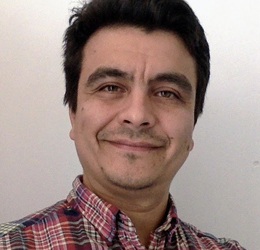 |
Áreas de Interes I study the jets of active galactic nuclei with the goal of understanding the mechanisms responsible for their high energy emission. My main tools are radio telescopes, and I have interest and experience in several aspects, like instrumentation, commissioning and telescope operations. Besides radio astronomy, I have experience in gamma-ray astronomy, applied statistics, time series analysis and optimization for telescope scheduling. |
|
José Maza - Profesor Titular
|
Ph.D., en Astronomía, 1979, U. de Toronto, Canada. Premio Nacional de Ciencias 1999. Línea de Investigación: Supernovas, Energía oscura, Galaxias Seyfert, Cuasares, Telescopía robótica. Teléfono: 56 (2) 2 977 1102 E-mail: jmaza[at]das.uchile.cl |
 |
Áreas de Interes |
|
René Méndez - Profesor Asociado
|
Ph.D., en Astronomía, 1995, Yale University, EEUU. Línea de Investigación: Estructura Galáctica, Vecindad Solar, Astrometría, Interferometría. Teléfono: 56 (2) 2 977 1117 - 56 (2) 2 978 0970 (FCFM) E-mail: rmendez[at]u.uchile.cl Webpage: http://www.das.uchile.cl/~rmendez/ |
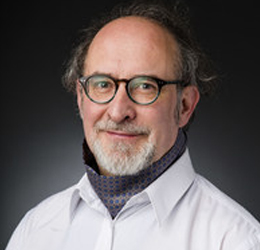 |
Áreas de Interés Estructura Galáctica: Cinemática & dinámica estelar La vecindad solar Sistemas estelares binarios y múltiples Astrometría, Interferometría de motas, técnicas observacionales. |
|
Ricardo Muñoz - Profesor Asociado
|
Ph.D. Astronomía, 2008, Universidad de Virginia, EEUU. Línea de Investigación: Galaxia esferoidales enanas, Materia oscura, Estructura del halo galactico, Nubes de Magallanes. Teléfono: 56 (2) 2 977 1133 E-mail: rmunoz[at]das.uchile.cl |
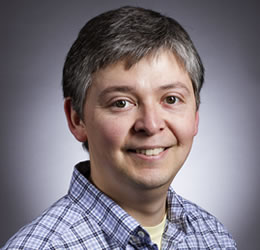 |
Áreas de Interes My current interests are focused primarily on the evolution of dwarf galaxies (particularly dwarf spheroidal galaxies) and their interactions with our Milky Way. My work involves observational and computational (N-body simulations) studies of these systems aimed at understanding the role that Galactic tides play in shaping their properties. Dwarf spheroidal galaxies are the faintest and possibly the darkest (most dark-matter dominated) kind of galaxies in the universe. Besides being interesting systems in their own right, they provide us with significant constraints on current cosmological models and can potentially teach us something about the nature of dark matter. |
|
Laura Pérez - Profesora Asistente
|
Ph.D. Astrofísica, 2013, Caltech, EEUU. Línea de Investigación: Formación de planetas en discos protoplanetarios, formación estelar, radio interferometría. Teléfono: 56 (2) 2 977 1129 E-mail: lperez[at]das.uchile.cl |
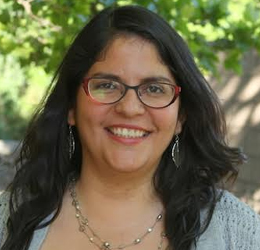 |
Áreas de Interes Protoplanetary disks: characterization of disk structure, dynamics, and evolution, with multi-wavelength observations. Planet Formation: placing observational constraints in the process of planet formation with resolved imaging of protoplanetary disks. Radio Interferometry: High-resolution imaging, calibration techniques, and radio telescopes. |
|
Patricio Rojo - Profesor Asociado
|
Ph.D. Astronomía, 2006, Cornell University, EEUU. Línea de Investigación: Planetas extrasolares, Asteroides del Sistema Solar, Poblaciones Estelares. Teléfono: 56 (2) 2 977 1136 E-mail: projo[at]das.uchile.cl |
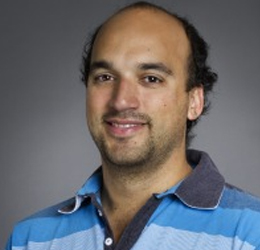 |
Áreas de Interes I study both extrasolar planets and minor bodies of the Solar System using ground based telescopes. In the former area, I specialize in exoatmospheric characterization through the study of high-precision transmission and/or emission spectra during transit or occultation, respectively. I am also interested in targeted radial velocity exoplanet surveys and in the photometric monitoring of transit events to detect temporal variation. I also participate in minor body surveys and binary characterization. Other areas of research include stellar populations in the solar neighbourhood. |
|
Mónica Rubio - Profesora Titular
|
Ph.D. en Astrofísica, 1992, U. de París, Francia. Línea de Investigación: Nubes de Magallanes, Medio Interestelar, Nubes Moleculares, Formación Estelar. Teléfono: 56 (2) 2 977 1111 E-mail: mrubio[at]das.uchile.cl |
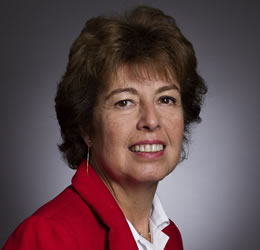 |
Áreas de Interes My main stream research is the study of the properties and physical conditions of molecular clouds in the LMC and SMC, and its relation to massive star formation. The LMC and SMC offer a unique laboratory to perform this study. Their proximity and their different conditions of the ISM, constitute very good systems to study the formation of molecular clouds and the star formation process in low metallicty environments. The results of these investigations can give important clues to these processes in the early universe, where the abundance of heavier elements and the content of dust was much lower. |
|
Maria Teresa Ruíz - Profesora Titular
|
Ph.D. en Astrofí,sica, 1975, U. de Princeton, EEUU. Premio Nacional de Ciencias 1997. Línea de Investigación: Enanas Blancas, Estrellas cercanas, Cúmulos Estelares. Teléfono: 56 (2) 2 977 1115 E-mail: mtruiz[at]das.uchile.cl |
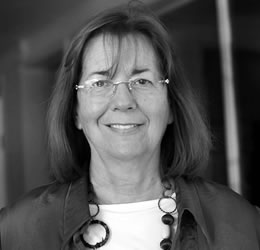 |
Áreas de Interes |
|






